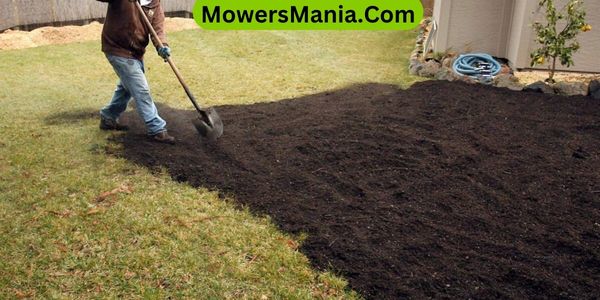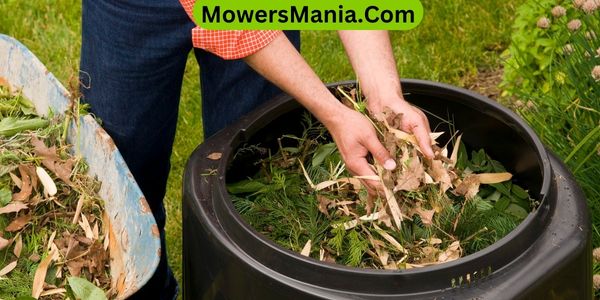If you’re wondering what type of compost is best for your lawn, you’ve come to the right place.
In this article, we’ll explore the benefits of using compost for your lawn, different types of compost for various lawn needs, and how to apply compost effectively.

By the end, you’ll be equipped with the knowledge to choose the right compost for your soil type and maintain a healthy, vibrant lawn.
Benefits of Using Compost for Lawns
When using compost for your lawn, you’ll notice improved soil structure and increased water retention. The organic matter in compost helps to bind soil particles together, creating a crumbly texture that allows for better aeration and root penetration.
This improved soil structure also promotes healthier microbial activity, which is essential for nutrient cycling and overall soil health.
Additionally, the organic matter in compost acts like a sponge, increasing the soil’s ability to hold onto moisture. This means less water runoff and improved drought resistance for your lawn.
Furthermore, applying compost to your lawn can help to suppress certain plant diseases and pests, reducing the need for chemical interventions.
The beneficial microorganisms present in compost can outcompete harmful pathogens, creating a more balanced and resilient ecosystem in your soil.
Types of Compost for Different Lawn Needs
For different lawn needs, consider using specific types of compost to address your lawn’s unique requirements. Different types of compost can cater to specific needs of your lawn, such as improving soil structure, adding nutrients, or enhancing water retention.
Here are some types of compost and their benefits for different lawn needs:
| Type of Compost | Benefits for Lawn |
|---|---|
| Manure Compost | Adds nutrients, improves soil structure, and enhances microbial activity |
| Leaf Mold Compost | Improves water retention, adds organic matter, and encourages earthworm activity |
| Grass Clipping Compost | Adds nitrogen, improves soil structure, and enhances microbial activity |
| Kitchen Waste Compost | Adds organic matter, improves soil fertility, and encourages beneficial microbial activity |
| Mushroom Compost | Improves soil structure, adds nutrients, and enhances water retention |
How to Apply Compost to Your Lawn?

To effectively apply compost to your lawn, carefully spread a thin layer of the selected compost over the entire lawn surface using a rake or shovel.
Follow these steps to ensure proper application:
- Begin by mowing your lawn to a short height to allow the compost to reach the soil more effectively.
- Use a rake or shovel to spread the compost evenly, ensuring that it reaches all areas of the lawn.
- After spreading the compost, lightly water the lawn to help the compost settle into the soil.
- Consider applying compost in the fall or spring for best results, as these are optimal times for the compost to break down and provide nutrients to the soil.
Choosing the Right Compost for Your Soil Type
Selecting the appropriate compost for your soil type is crucial for nurturing a healthy and vibrant lawn. Different soil types have different needs, so it’s essential to choose the right compost to address those specific requirements.
If your soil is sandy and drains quickly, look for compost that can help improve water retention and provide essential nutrients. For clay soils that tend to compact easily and drain poorly, seek out compost that can enhance drainage and add organic matter to loosen the soil.
If your soil is acidic, consider using compost that can help balance the pH levels and promote healthier grass growth. On the other hand, for alkaline soils, opt for compost that can help lower the pH levels and create a more suitable environment for your lawn.
Understanding your soil type and selecting the right compost won’t only improve the overall health of your lawn but also reduce the need for chemical fertilizers and pesticides.
By nurturing your soil with the appropriate compost, you can create a resilient and lush lawn that thrives in its specific environment.
Maintaining a Healthy Lawn With Compost

Improving your soil with the right compost is essential for maintaining a healthy lawn and ensuring its long-term vitality. By incorporating compost into your lawn maintenance routine, you can reap numerous benefits for the health and appearance of your grass.
Here are four key ways compost can help you maintain a lush and vibrant lawn:
- Improved Soil Structure: Compost helps to loosen compacted soil, allowing for better root penetration and water absorption.
- Nutrient-Rich Soil: Compost adds essential nutrients to the soil, promoting healthy grass growth and overall lawn vigor.
- Enhanced Water Retention: The organic matter in compost acts like a sponge, helping the soil retain moisture and reducing the frequency of watering.
- Natural Weed Control: A healthy lawn is less susceptible to weed invasion, and compost can help suppress weed growth by promoting strong, dense grass growth.
Frequently Asked Questions [FAQs]
Can I Use Compost Made From Animal Manure on My Lawn?
Yes, you can use compost made from animal manure on your lawn. It provides valuable nutrients and helps improve soil structure. However, ensure it’s well-aged and fully composted to prevent any potential issues.
How Can I Tell if My Lawn Needs Compost or Fertilizer?
You can tell if your lawn needs compost or fertilizer by conducting a soil test to check for nutrient deficiencies and pH levels. If the test indicates low organic matter, compost can help improve soil health.
Is It Possible to Over-Apply Compost to My Lawn?
Yes, it’s possible to over-apply compost to your lawn. Excessive compost can lead to nutrient imbalances and water retention issues. It’s essential to follow recommended application rates to avoid harming your lawn.
Can I Use Homemade Compost From My Kitchen Scraps on My Lawn?
Yes, you can use homemade compost from kitchen scraps on your lawn. It’s a great way to recycle organic waste and improve soil health. Just ensure the compost is well-rotted and spread it evenly.
Will Using Compost on My Lawn Attract Pests or Animals?
Using compost on your lawn may attract pests or animals if not properly managed. To prevent this, avoid adding meat or dairy products to your compost, and regularly turn and mix the compost to discourage pests.
Conclusion
So, when it comes to choosing the best type of compost for your lawn, consider the specific needs of your soil and grass.
Whether you opt for manure-based compost for added nutrients or leaf-based compost for improved soil structure, the benefits of using compost for your lawn are clear.
With proper application and maintenance, you can achieve a healthy and lush lawn that will be the envy of your neighborhood.



